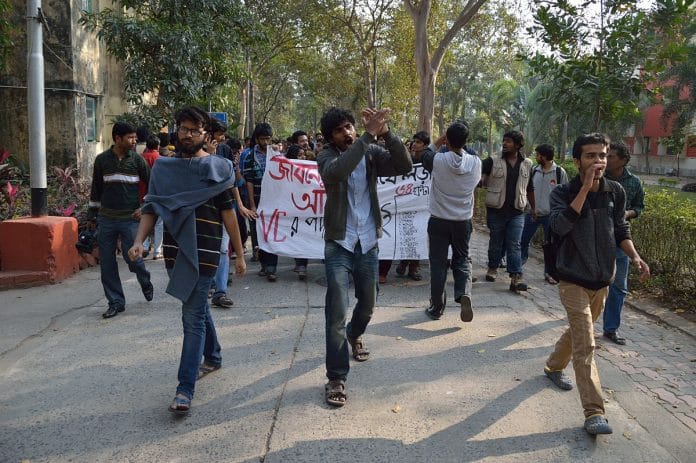Admission tests have helped build a diverse campus, allowing state board students an equal shot at entry despite lower marks than their ISC peers.
New Delhi: Students at West Bengal’s premier Jadavpur University (JU) organised a sit-in this week against the administration’s decision to scrap admission tests for six arts courses, describing it as an assault on a “40-year-old legacy” of the institution.
They even led a 31-hour gherao of vice-chancellor Suranjan Das’ office Tuesday and Wednesday. On Friday, vice-chancellor met the chancellor and governor K.N. Tripathi, where the latter sought to know the recent developments in the university. On being approached after the meeting, the VC refused to make any comment.
Admission tests are rare in India’s arts colleges, with most, including those under Delhi University, basing enrollment on Class XII results. This is exactly what the JU executive council has proposed, a move students fear will erode the university’s appeal as a campus accessible to youngsters not bound by syllabus-based constraints. The council is reportedly of the opinion that the test-based admission process is not transparent.
As many as 16 of the JU English department’s 18 teachers have opted out of the admission process in protest against the decision, which affects the subjects of English, comparative literature, history, Bengali, political science, and philosophy.
Social media is abuzz with hashtags like #handsoffju and #handsoffjadavpur, with alumni from around the world showing solidarity with the movement.
“Certain ‘low-scoring’ 10+2 subject combinations can put bright students at a disadvantage during college admissions. So, an admission test makes a lot of sense,” said Nilanjana Deb, a professor of English.
It is believed that 40 years of admission tests have helped build a healthy and diverse campus at JU, allowing rural students with a state board education an equal shot at admissions despite lower marks than their ISC/CBSE peers.
The Trinamool angle
Ever since JU became the springboard of anti-establishment movements like #Hokkolorob, which took shape in the wake of sexual harassment allegations against Trinamool-affiliated students, it is said to have been in the bad books of the state’s ruling party.
The JU executive council is reportedly staffed with Trinamool loyalists.
West Bengal education minister Partha Chatterjee had expressed his disappointment with the “declining culture” of the institution when an exam-based admission system was mooted in April last year, despite the fact that it featured in the Centre’s list of India’s top 10 universities.
Voices of protest
“Admission tests are important because they give everyone a fair chance. It taught me that syllabus is not the boundary of learning. Marks do not define you or your future,” said Bidisha Mukherjee, a former student in the department of Bengali.
“The university authorities have been suddenly and without warning acting as if they have lost all faith in the ability of JU teachers to conduct their own admission tests,” said Rimi B. Chatterjee, a teacher in the English department.
“However, not one single person has been able to point out any allegations, complaints or evidence of wrongdoing on our parts,” she said.
“The entrance procedure is integral to Jadavpur University, not only because it allows a lot many students a second chance at studying at a premier institution despite not doing so well in their boards, but also because there are disciplines like comparative literature (CL) that are not offered to students on a school level,” said Jitsoma Banerjee, a student of the subject.
“On what other basis are students to be evaluated for a discipline like CL,” she asked.
Trouble at Presidency
This academic year, admissions have allegedly been marred by reports of unwarranted interventions by the Trinamool Congress, including rescheduling of exam dates and, in many cases, the cancellation of exams altogether. Also, several members of the Trinamool’s student wing have been axed for allegations of rampant extortion on the promise of seats.
The first such instance saw the ruling party abruptly hand over admissions to the premier Presidency University to the West Bengal Joint Entrance Board, two years ago.
As a result, a multiple-choice test was introduced for all subjects, including literature and history, where assessment was previously based on a student’s descriptive-analytical capacity.






